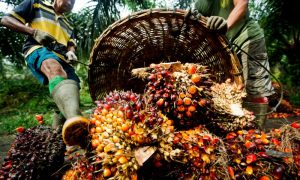By Onome Amuge
Nigeria and nine other countries have signed the Africa Sustainable Commodities Initiative (ASCI) declaration, a single set of principles aimed at promoting the sustainable production of palm oil, cocoa, rubber and other agricultural commodities in the continent.

The ASCI Declaration is an expansion of the principles agreed at the Marrakesh Declaration for Sustainable Development of the palm oil sector in 2016. It also acknowledged the role of agricultural commodity development as a driver of deforestation, while emphasising the critical role of forests and forest conservation in addressing climate change.
The Marrakesh Declaration was implemented through the African Palm Oil Initiative (APOI),and comprises ten West and Central Africa countries that account for 25 percent of the world’s tropical forest and 75 percent of Africa’s forests. The countries include; Cameroon, Central African Republic, Côte d’Ivoire, Democratic Republic of Congo, Gabon, Ghana, Liberia, Nigeria,Republic of Congo and Sierra Leone.
An initiative of the Tropical Forest Alliance,the APOI is facilitated by Proforest, a global mission-driven organisation, focused on the production base and supply chains of agricultural and forestry commodities. The initiative provides a framework for governments to engage with local communities and the private sector, while giving companies a channel to fulfil their commitments to reduce commodity-driven deforestation.
Though the majority of global oil palm production is in Indonesia,Malaysia and Thailand, all located in Southeast Asia, the African Palm Oil Initiative noted that oil palm is native to Africa. To enhance and improve food security through the palm oil value chain, the initiative stated that production has to be done in a responsible way, targeted at sustaining livelihoods for millions of Africans, while protecting West and Central Africa’s remaining rainforests.
Abraham Baffoe, director of Proofrest in a statement made available to business A.M, explained that the launch of the ASCI was important as all stakeholders were engaged at the national, regional and local level through the development of the principles to promote the sustainable production of palm oil.
“From CoP22 in 2016, when the Marrakesh Declaration was signed, we saw huge progress at CoP26 in 2021 where every country demonstrated crucial milestones to achieve the sustainable development of palm oil,” he said.
According to the 2021/22 oil palm production data by Statista, Nigeria is the fifth largest palm oil producer in the world and highest in Africa, with a production volume averaging 1.4 million metric tonnes.
The industry has over the years witnessed significant growth in domestic and international demand. However, the South East Asian region has for a long time dominated production and trade of the commodity, creating the need to develop the industry in Africa.
Recognising Nigeria’s potential for growth in the palm oil industry and the economic relevance of sustainable production while addressing the impact of climate change, the African Palm Oil Initiative formulated a policy expected to advance the country’s output,particularly in Edo State. These include:
Protection of Rights: The initiative stated that Free, Prior and Informed Consent (FPIC) must be given by indigenous people and local communities to enable agricultural development.
Certified Commitment: All palm oil companies operating in the state must comply with the requirements of the Roundtable on Sustainable Palm Oil.
Produce, Protect, Rehabilitate: Companies in the oil palm sector must integrate smallholder development into operations, protect forest areas within concessions and provide resources to restore degraded forest equivalent to 25 percent of their land holding.







